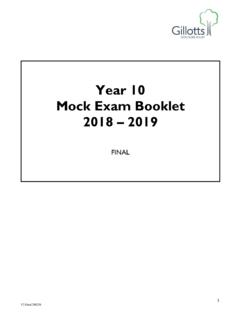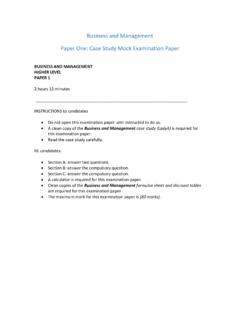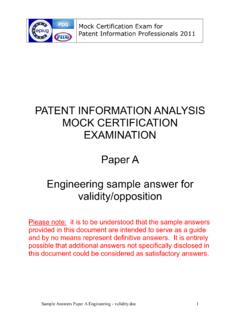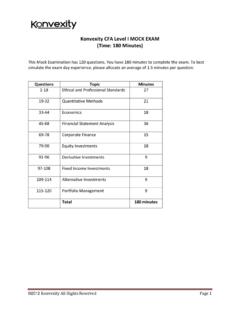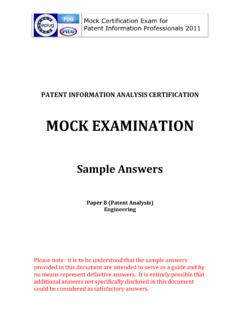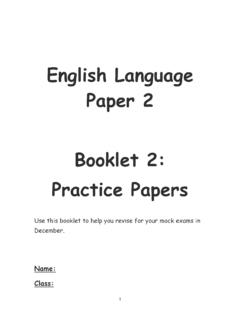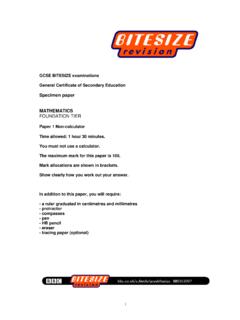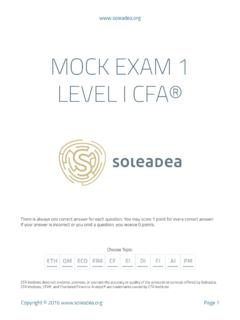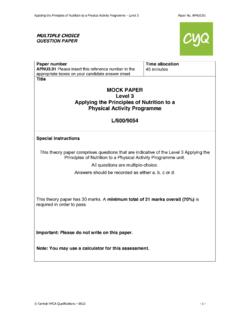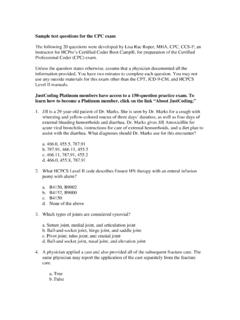Transcription of GETTING THE MOST OUT OF A MOCK EXAM - aglobalwall.com
1 GETTING THE MOST OUT OF A mock EXAM 1 Why? Sitting a mock Exam in the time allocated, without reference to study materials, is an important element in preparing for the ACCA examination. Attempting a mock provides essential practice in examination technique and time management. Although there is no formal distinction between the 15 minutes reading and planning time and the three hours writing time you should still allocate time to reading and planning. When? You should plan to sit a mock Exam in good time before the ACCA exam so that you can address any issues arising. Ideally, this will be two to three weeks before the real exam date; attempt too early and you may not have done sufficient revision to make a good attempt at it attempt too late and, if it seems tough, you may panic if you do not have time to do further revision or sit a further mock . How? Preparation Set aside half a day in which you can attempt a mock in a single sitting there is no substitute for this.
2 Revise all core topics through question practice before you attempt the mock and have a plan for how you expect to tackle it ( Q1 first or the best choice question first). Create exam conditions for yourself as best you can clear your desk of all reference material, including your mobile phone. Impose strict time conditions on your attempt do not allow yourself to overrun. Attempt Practice all relevant aspects of exam technique: Reading and planning: Read no more than the first sentence of the scenario to identify what type of organisation you are dealing with a commercial company (listed or private? parent and/or subsidiary(ies)?) or not-for-profit organisation. Read the requirements of all parts of the question it is important to plan all parts together, to ensure that you correctly distinguish each part and avoid repetition in your answers. Identify which requirements lend themselves to a tabulated answer ( columnar layout).
3 GETTING THE MOST OUT OF A mock EXAM 2 Read the scenario underline key information, jot down brief notes on the face of the question paper , reference paragraphs of information to the various requirements. Bearing in mind that the information given in the scenario is there for a reason you may need to read the scenario twice to do this analysis thoroughly. For a requirement that calls for a wholly or predominantly written answer, use the verb (instruction) and marks to plan how many points you should aim to make. For computational requirements, decide what workings you will need. Writing professional exams call for a demonstration of professional skills, for example: A specified layout ( report or letter ); A professional tone do not use textspeak; Structure use (sub)headings which clearly address the requirements and appendices for any detailed workings. Time management attempt all parts of all questions in the time allowed.
4 Always move on to the next requirement or question when the time is up. Reflection After sitting it, it is important to reflect on the experience. Did you feel time-pressured? If yes, consider to what extent that time pressure might have been self-inflicted ( trying to finish a requirement instead of moving on to the next). Did you tackle the exam as you planned (see preparation above)? If you attempted a Section B question first, was that the best strategy? Or did it leave you short of time for Q1? On which topics did you feel most/least confident? Although there is a certain degree of comfort to be obtained in attempting further Qs on a topic which you feel you have grasped well, the majority of your study time remaining before the examination should be devoted to areas of weakness. Marking Model answers and a marking scheme are provided to help you assess your attempt. Do this as a separate exercise and, if you have a study buddy, consider swapping scripts for this.
5 For computations, if you did not get the correct answer, award yourself partial marks only on the basis of clearly referenced workings. For written answers, if your answer bears little relation to the model answer consider carefully whether you answered the question set.

